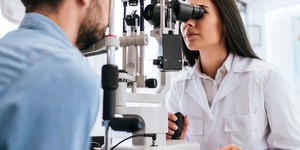Health Careers (44 results)
|
Select a resource
Filter by
Sort by
|
Career Profile
Many decisions regarding a person's health depend on knowing the patient's genetic risk of having a disease. Genetic counselors help assess those risks, explain them to patients, and counsel individuals and families about their options.
Read more
Career Profile
Families and couples face many problems, from difficult child behaviors, depression, and compulsions to anger-management issues and eating disorders. Sometimes these problems get repeated generation after generation, whereas other times they arise spontaneously. Marriage and family therapists can help break the cycles of maladaptive behaviors. They provide goal-oriented counseling that focuses on the family and close relationships. They diagnose mental health problems, give psychological tests,…
Read more
Career Profile
Do you enjoy solving mysteries? Getting to the end of a "who did it" mystery novel can be lots of fun! But are there mysteries in real life? You bet there are! A pathologist is a medical detective, and their job is to figure out the root cause of real-life medical puzzles. Pathologists work in a wide range of fields and can help diagnose types of cancer, find out what killed a person, and investigate how disease progresses on a molecular level. If you enjoy employing cool logic to solve…
Read more
Career Profile
Pharmacists are the medication experts. They advise doctors, nurses, and patients on the correct drug dosage for a patient's weight, age, health, and gender; on interactions between drugs; on side effects; on drug alternatives; on costs; and on ways to give drugs. They also dispense drugs at pharmacies, according to prescriptions, checking for dangerous drug interactions, and educating patients on how to take drugs, what reactions to watch out for, and how long it should take for drugs to work.
Read more
Career Profile
The first leading cause of death in the United States is heart disease, and the third leading cause is stroke. Cardiovascular technologists or technicians are key members of the healthcare teams that are on the front lines of treating heart and blood vessel diseases and conditions. They set up monitors and tests to help physicians diagnose heart or blood vessel problems. Then they work with physicians to treat an identified problem. For example, they might help break up a blockage in an artery…
Read more
Career Profile
Some patients prefer to treat certain medical problems without the use of medications, surgery, or other traditional therapies. Chiropractors diagnose and treat problems involving the muscles, skeleton, and nervous system using alternative therapies, such as manipulation of the spine and joints, acupuncture, massage, bracing, and heat therapy. They also counsel patients on how to achieve good overall health through diet, exercise, stress management, and rest. They try to treat the patient as a…
Read more
Career Profile
Do you like a good mystery? Well, an epidemiologist's job is all about solving mysteries—medical mysteries—but instead of figuring out "who done it" like a police detective would, they figure out "what caused it." They find relationships between a medical condition and things like human behavior, environmental toxins, genes, medical treatments, other diseases, and geographical location. For example, they ask questions like what causes multiple sclerosis? How can we prevent brain…
Read more
Career Profile
Hematologists are all about blood. They diagnose people with blood disorders and prescribe or administer appropriate treatments. There are many different types of blood disorders, including bleeding disorders and blood cancers. Hematologists also investigate ways to improve diagnosing and treatment of these disorders.
Read more
Career Profile
Are you interested in working in the medical field to be an advocate and care for patients? If so, a nurse practitioner may be the career for you. Nurse practitioners require less school than a doctor, but with similar jobs. Nurse practitioners diagnose and treat illness as a part of a healthcare team or by themselves. Another important piece of their job is to teach patients and their families. They help patients stay healthy and teach them how to manage diseases. Nurse practitioners can work…
Read more
Career Profile
Optometrists are the primary caretakers of our most important sense—vision. They diagnose and detect problems not only with vision, but with the health of the eye and the whole body. Based on their diagnoses, they prescribe glasses, contact lenses, and medications; refer patients to ophthalmologists for surgery; or develop treatment plans, like vision therapy, to help correct for deficits in depth perception. Their work helps people live better at every stage of life.
Read more
|














